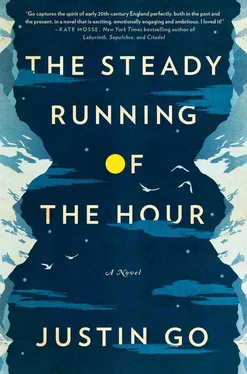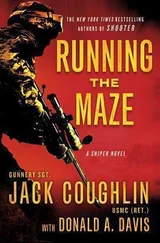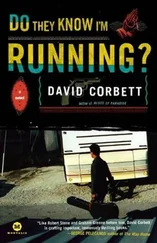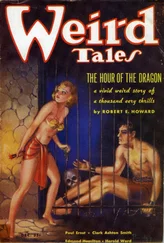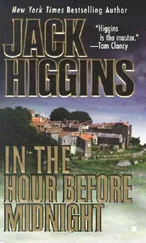— Only going to warm them up a bit.
Ashley tries to keep reading. It is too noisy to concentrate, but it is too cold to sit any distance from the fire. He reads the sentence again.
Every night, do you understand, I see my comrades of the Matterhorn slipping on their backs, their arms outstretched, one after the other, in perfect order at equal distances — Croz the guide, first, then Hadow, then Hudson, and lastly Douglas.
Jeffries and Bennett finish their card game and the officers discuss rumors of the battalion’s next destination. Ashley shuts his book. He draws the blanket around his neck until only his eyes are visible, his knees tapping at each other in the cold. Bennett wonders whether the battalion has any chance of being transferred out of France.
— They say the adjutant mentioned Palestine—
— Rumor, Ashley interjects. Worthless rumor.
— You’re just not a man of faith. You never were.
Jeffries takes the last of the peanuts from Ismay and throws the sack in the brazier. He jerks his chin toward Ashley.
— The spymaster believes in the Kaiser’s pistol.
— That’s true, Ashley says. That’s no rumor.
— I’ve heard nothing of the Kaiser’s pistol, Bennett says.
— That’s because it isn’t a rumor, Ashley says. The truth hardly spreads.
Ashley leans back in his chair and smiles. He explains that the German emperor, like all men who make war, has always preferred the trappings of war to the risky endeavor itself. The Kaiser loves uniforms, Ashley says, and wore one in civil life long before the present conflict. Accompanying this uniform is a fine leather holster, and in this holster is a silver-plated Chamelot-Delvigne revolver that the emperor carries with him always. The pistol’s ivory handle is engraved with the letter V and a crown, for the weapon was a gift from the Kaiser’s grandmother and fellow sovereign.
— Victoria, Ismay murmurs. Rum story.
— It’s no story, Ashley says. It’s true.
— Why not get another revolver?
— Maybe he liked the old lady, Bennett offers.
— It’s more than that, Ashley says. He keeps it for a reason, even if he doesn’t know the reason.
Laughing, Jeffries shakes his head.
— What’s the reason?
— To remember who the enemy is, Ashley says.
— And who is that?
Ashley smiles again, but he does not answer. The officers get up and begin to dress for dinner. Bennett runs a comb through his hair, suddenly turning to Ashley.
— Do you think he’s fired the pistol at an Englishman?
— Only at English venison, I’d wager. He has other fellows for that business.

The night is windless but freezing. The estaminet stands in the center of a half-ruined village, across the street from a boucherie leveled nearly to its foundations. But the little estaminet, with its chipped marble tables, iron stove and tuneless piano, is yet untouched. The madame opens the door, her white hair gathered in an elaborate bun atop her head. Frantically she waves them in from the cold.
— Bonsoir , she calls sonorously. Entrez, messieurs, entrez!
The dining room is empty, so the officers take their pick of a round table beside the stove. The madame takes their greatcoats as she barks instructions to a pair of serving girls. The English are to be given both claret and chardonnay, to choose from as they please. The madame regrets she is without champagne. One girl brings out the wine as the other puts a new log in the stove. Jeffries tells the madame they will take whatever she has in the kitchen, the best food she can offer.
— On prend le Bordeaux, je crois , Jeffries says.
A blond girl uncorks the wine and fills each glass. Jeffries raises his.
— To sweethearts and wives.
The others raise their glasses and reply in chorus.
— May they never meet.
The claret is very dry and at first Ashley drinks little. The madame brings out onion soup and the officers spoon it up with gusto. They talk of military decorations, of the paucity of medals awarded by certain regiments. Ismay calls for a second bottle of claret before the first is empty. Jeffries mentions the Victoria Cross and Ismay scoffs.
— No fairer than a penny arcade. A chap can go on slaying Huns and rescuing wounded all day, but if there isn’t an officer about to witness it, he’ll go home empty-handed. As if the word of fifty privates weren’t worth that of a single lieutenant.
The madame sets down a plate of lobster mayonnaise, each portion cupped in a lettuce leaf.
— If we took private soldiers’ evidence, Jefferies remarks, we’d be issuing VCs with the rum ration.
— It’s all bosh, Ismay retorts. Take the spymaster here.
The officers all look at Ashley. Ismay picks up a lettuce leaf and devours it in one bite, wiping his mouth.
— Heard about that business at the Empress, Ismay says. Very game. You might have got a VC for that, but you couldn’t hold the trench. Which wasn’t your fault, naturally, but it meant you were lucky to get decorated at all. You’d think the army would know by now that bravery hasn’t a damned thing in common with success. But they don’t.
Ashley says nothing. The madame brings in four bowls of blanquette de veau , a stew of veal shoulder with carrots and onions, the white sauce glistening with butter and cream. The officers eat contentedly in silence, Ismay draining his glass of claret.
After they finish the stew the blond girl brings out a wheel of ripe Camembert on an ancient serving tray. As Ashley slices the cheese, Ismay makes crude jokes to the girl. The brunette pours more wine and Ashley talks with her about the geography of the surrounding country. Ismay overhears them and interrupts.
— Le jeune lieutenant est très brave , Ismay insists. Très brave . He took a Boche trench with only a few men. Hundreds of men had tried to take this trench—
Ashley grimaces, but the girl looks at him with interest.
— C’est vrai?
— Non , Ashley says. The Germans thought there were more men than me, so they retreated. That was all. They came back later.
Ismay protests that the young lieutenant is in fact très brave . He directs his glass toward Ashley’s tunic, speaking French with a strong English accent.
— Do you see that purple-and-white ribbon? It’s the English Croix de Guerre.
The girl begins to say something, but the madame comes out with a box of Upmann coronas. Each man takes a cigar. A bottle of brandy appears and Ismay apologizes to the girls as they light the cigars and pour out the brandy.
— We’re all married men, Ismay says. We’re only joking around.
The blonde smiles, but the brunette eyes the group of young men intently, the bottle in her hand. She shakes her head.
— C’est pas vrai.
— We’re all bachelors then, Ismay says. So much the better. Pity for married men to be killed in action.
— You’re not all bachelors, the brunette says, looking at Ashley. He is married. Or engaged. One can see it clearly.
— Do you imagine any woman would marry him? Ismay protests. Even an Englishwoman?
Everyone laughs. The cigars are finished and the madame tallies the bill on a small chalkboard and sets it on the table. Ismay leans forward to read the bill and knocks his wineglass over, the claret saturating the tablecloth. He complains loudly in English.
— Highway robbery. Seventeen francs a bottle for that brandy? Double what it cost last year. And watered down to boot.
The madame clears the table and folds away the soaked tablecloth. She peers inquiringly at the officers.
Читать дальше
